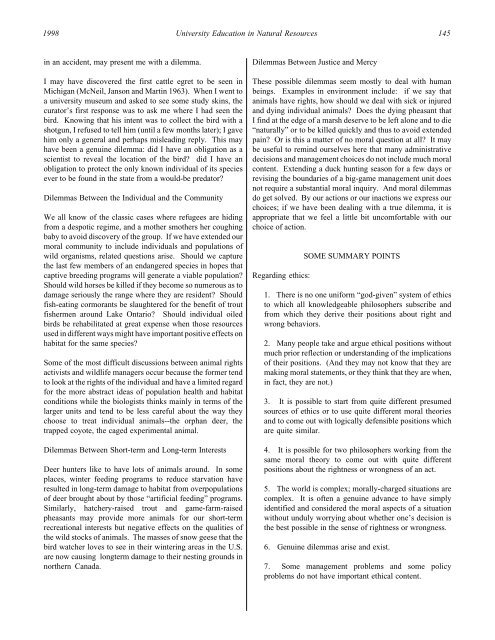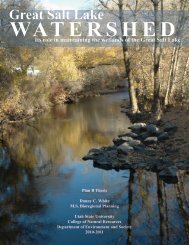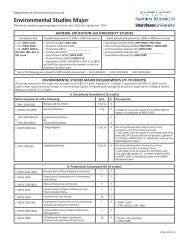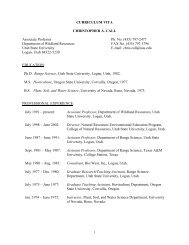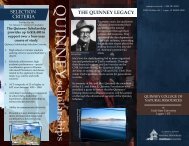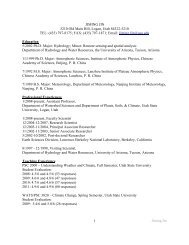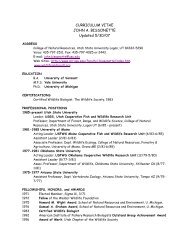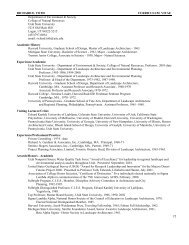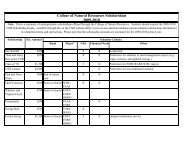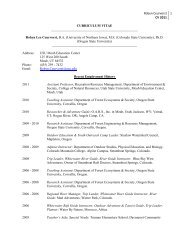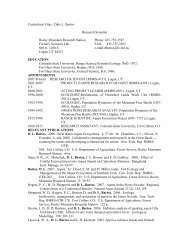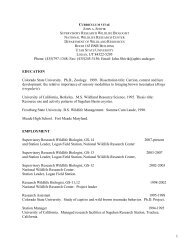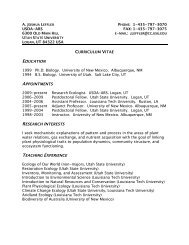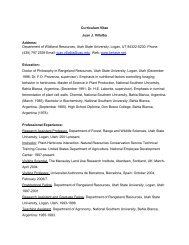University Education in Natural Resources - CNR Home - Utah State ...
University Education in Natural Resources - CNR Home - Utah State ...
University Education in Natural Resources - CNR Home - Utah State ...
Create successful ePaper yourself
Turn your PDF publications into a flip-book with our unique Google optimized e-Paper software.
1998<br />
<strong>University</strong> <strong>Education</strong> <strong>in</strong> <strong>Natural</strong> <strong>Resources</strong> 145<br />
<strong>in</strong> an accident, may present me with a dilemma.<br />
I may have discovered the first cattle egret to be seen <strong>in</strong><br />
Michigan (McNeil, Janson and Mart<strong>in</strong> 1963). When I went to<br />
a university museum and asked to see some study sk<strong>in</strong>s, the<br />
curator’s first response was to ask me where I had seen the<br />
bird. Know<strong>in</strong>g that his <strong>in</strong>tent was to collect the bird with a<br />
shotgun, I refused to tell him (until a few months later); I gave<br />
him only a general and perhaps mislead<strong>in</strong>g reply. This may<br />
have been a genu<strong>in</strong>e dilemma: did I have an obligation as a<br />
scientist to reveal the location of the bird? did I have an<br />
obligation to protect the only known <strong>in</strong>dividual of its species<br />
ever to be found <strong>in</strong> the state from a would-be predator?<br />
Dilemmas Between the Individual and the Community<br />
We all know of the classic cases where refugees are hid<strong>in</strong>g<br />
from a despotic regime, and a mother smothers her cough<strong>in</strong>g<br />
baby to avoid discovery of the group. If we have extended our<br />
moral community to <strong>in</strong>clude <strong>in</strong>dividuals and populations of<br />
wild organisms, related questions arise. Should we capture<br />
the last few members of an endangered species <strong>in</strong> hopes that<br />
captive breed<strong>in</strong>g programs will generate a viable population?<br />
Should wild horses be killed if they become so numerous as to<br />
damage seriously the range where they are resident? Should<br />
fish-eat<strong>in</strong>g cormorants be slaughtered for the benefit of trout<br />
fishermen around Lake Ontario? Should <strong>in</strong>dividual oiled<br />
birds be rehabilitated at great expense when those resources<br />
used <strong>in</strong> different ways might have important positive effects on<br />
habitat for the same species?<br />
Some of the most difficult discussions between animal rights<br />
activists and wildlife managers occur because the former tend<br />
to look at the rights of the <strong>in</strong>dividual and have a limited regard<br />
for the more abstract ideas of population health and habitat<br />
conditions while the biologists th<strong>in</strong>ks ma<strong>in</strong>ly <strong>in</strong> terms of the<br />
larger units and tend to be less careful about the way they<br />
choose to treat <strong>in</strong>dividual animals--the orphan deer, the<br />
trapped coyote, the caged experimental animal.<br />
Dilemmas Between Short-term and Long-term Interests<br />
Deer hunters like to have lots of animals around. In some<br />
places, w<strong>in</strong>ter feed<strong>in</strong>g programs to reduce starvation have<br />
resulted <strong>in</strong> long-term damage to habitat from overpopulations<br />
of deer brought about by those “artificial feed<strong>in</strong>g” programs.<br />
Similarly, hatchery-raised trout and game-farm-raised<br />
pheasants may provide more animals for our short-term<br />
recreational <strong>in</strong>terests but negative effects on the qualities of<br />
the wild stocks of animals. The masses of snow geese that the<br />
bird watcher loves to see <strong>in</strong> their w<strong>in</strong>ter<strong>in</strong>g areas <strong>in</strong> the U.S.<br />
are now caus<strong>in</strong>g longterm damage to their nest<strong>in</strong>g grounds <strong>in</strong><br />
northern Canada.<br />
Dilemmas Between Justice and Mercy<br />
These possible dilemmas seem mostly to deal with human<br />
be<strong>in</strong>gs. Examples <strong>in</strong> environment <strong>in</strong>clude: if we say that<br />
animals have rights, how should we deal with sick or <strong>in</strong>jured<br />
and dy<strong>in</strong>g <strong>in</strong>dividual animals? Does the dy<strong>in</strong>g pheasant that<br />
I f<strong>in</strong>d at the edge of a marsh deserve to be left alone and to die<br />
“naturally” or to be killed quickly and thus to avoid extended<br />
pa<strong>in</strong>? Or is this a matter of no moral question at all? It may<br />
be useful to rem<strong>in</strong>d ourselves here that many adm<strong>in</strong>istrative<br />
decisions and management choices do not <strong>in</strong>clude much moral<br />
content. Extend<strong>in</strong>g a duck hunt<strong>in</strong>g season for a few days or<br />
revis<strong>in</strong>g the boundaries of a big-game management unit does<br />
not require a substantial moral <strong>in</strong>quiry. And moral dilemmas<br />
do get solved. By our actions or our <strong>in</strong>actions we express our<br />
choices; if we have been deal<strong>in</strong>g with a true dilemma, it is<br />
appropriate that we feel a little bit uncomfortable with our<br />
choice of action.<br />
Regard<strong>in</strong>g ethics:<br />
SOME SUMMARY POINTS<br />
1. There is no one uniform “god-given” system of ethics<br />
to which all knowledgeable philosophers subscribe and<br />
from which they derive their positions about right and<br />
wrong behaviors.<br />
2. Many people take and argue ethical positions without<br />
much prior reflection or understand<strong>in</strong>g of the implications<br />
of their positions. (And they may not know that they are<br />
mak<strong>in</strong>g moral statements, or they th<strong>in</strong>k that they are when,<br />
<strong>in</strong> fact, they are not.)<br />
3. It is possible to start from quite different presumed<br />
sources of ethics or to use quite different moral theories<br />
and to come out with logically defensible positions which<br />
are quite similar.<br />
4. It is possible for two philosophers work<strong>in</strong>g from the<br />
same moral theory to come out with quite different<br />
positions about the rightness or wrongness of an act.<br />
5. The world is complex; morally-charged situations are<br />
complex. It is often a genu<strong>in</strong>e advance to have simply<br />
identified and considered the moral aspects of a situation<br />
without unduly worry<strong>in</strong>g about whether one’s decision is<br />
the best possible <strong>in</strong> the sense of rightness or wrongness.<br />
6. Genu<strong>in</strong>e dilemmas arise and exist.<br />
7. Some management problems and some policy<br />
problems do not have important ethical content.


